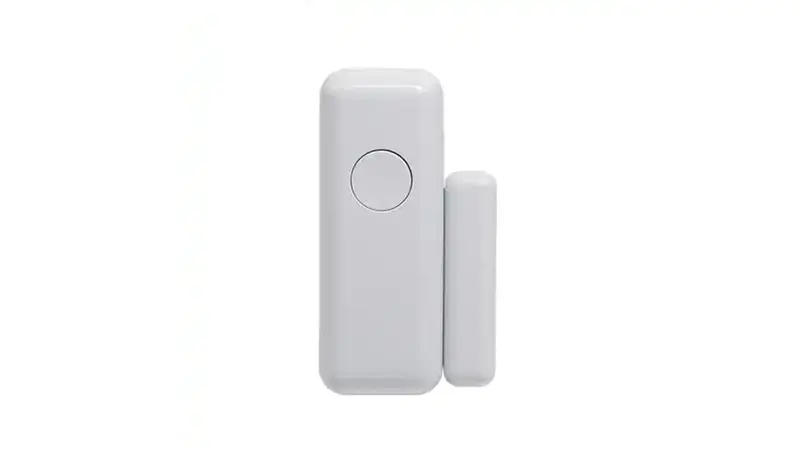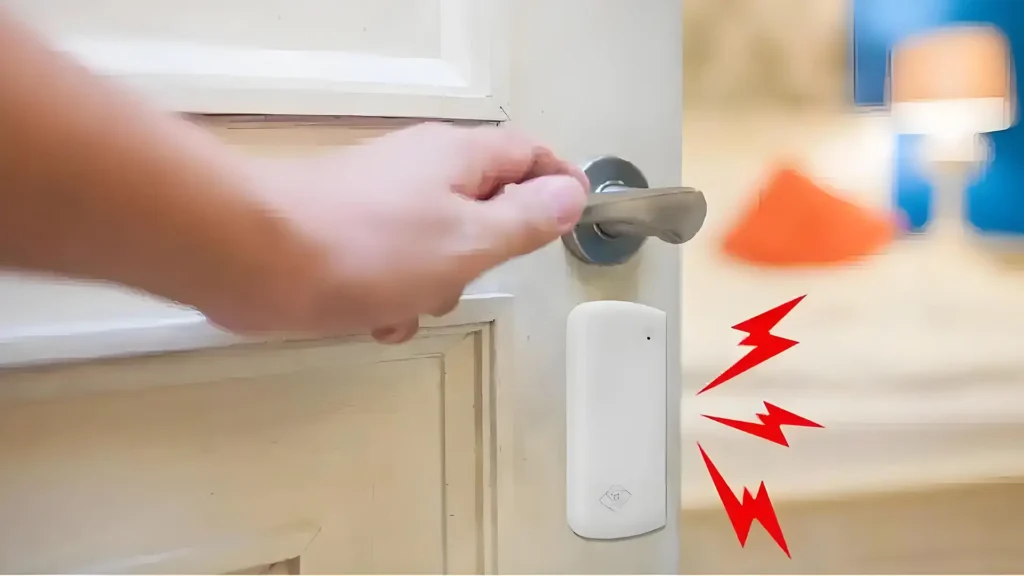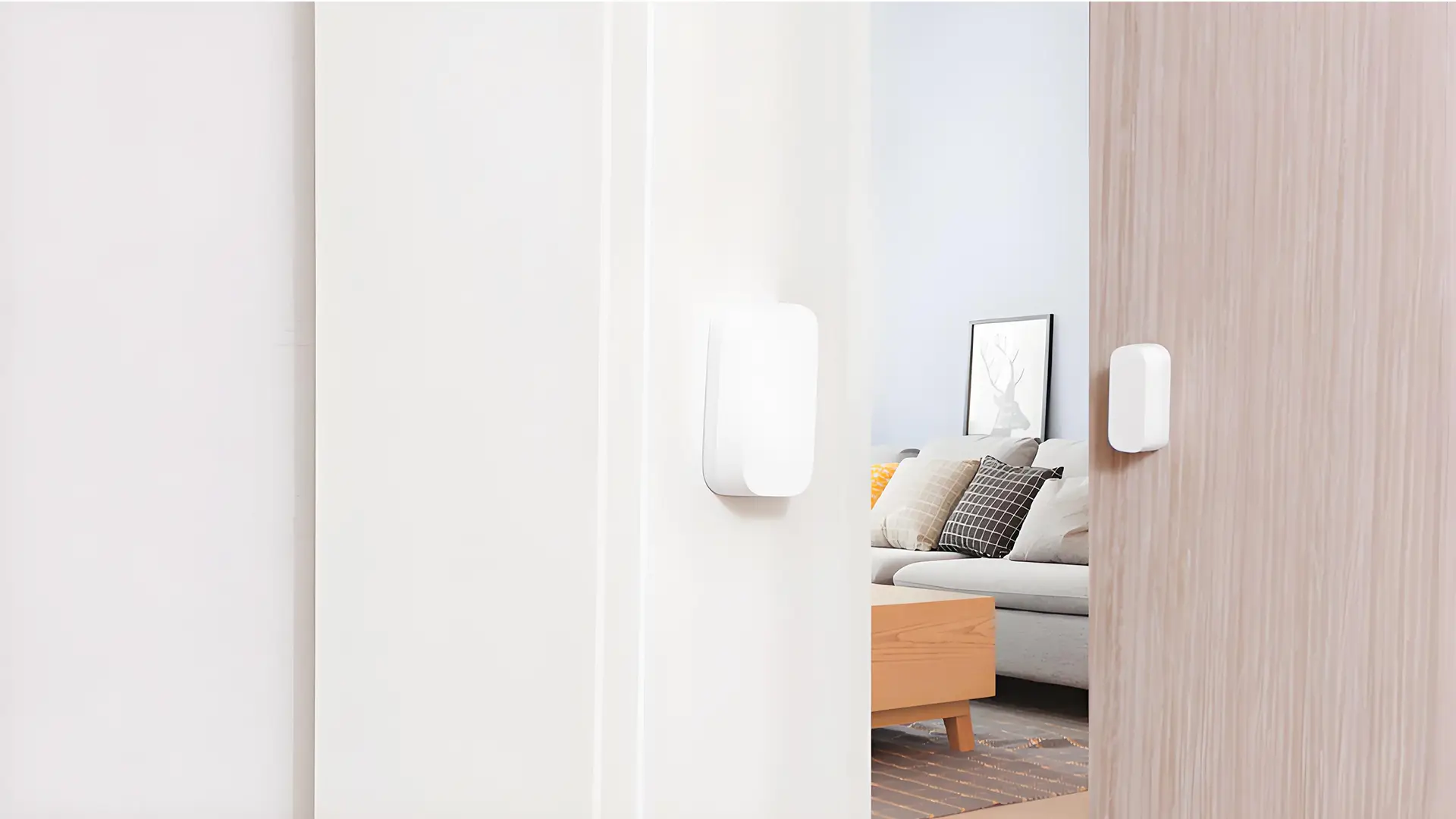With the development of technology, many traditional appliances are gradually becoming intelligent, and smart homes have become a part of life. Door sensors are a highly cost-effective intelligent device. Bluetooth door sensors occupy a significant market share in the door sensor market due to their low price and low power consumption. In this article, we will delve into Bluetooth door sensors to select the model that satisfies us the most.
What is a Bluetooth Door Sensor?
Bluetooth smart door sensor is a door sensor device that uses Bluetooth technology for wireless communication and sensing. It sends detected information to connected smartphones or other smart devices through Bluetooth. Bluetooth door sensors usually consist of two parts, one is a sensor installed on the door, and the other is a magnet or trigger installed on the door frame. The door sensor can convert the signal of opening or closing the door into an electrical signal and send this information to the background and user’s phone.
The Principle of Bluetooth Smart Door Sensor
The principle of Bluetooth smart door magnetic sensor is mainly based on magnetic switch and Bluetooth communication technology.
Principle of magnetic switch
The core component of the door magnetic sensor is the reed switch, which is a normally open magnetic switch. When the permanent magnet is close enough to the reed switch (usually less than 5 millimeters), the two contacts inside the reed switch will be magnetically attracted, equivalent to closing the switch; When the permanent magnet leaves a certain distance, the contact piece returns to its original position under the action of elasticity, and the switch is disconnected. This change in on-off state is used to detect whether doors, windows, etc. have been illegally opened or moved.
Bluetooth communication technology
The door magnetic sensor converts the door and window status signals into corresponding digital signals, which are transmitted to the mobile phone or Bluetooth gateway through Bluetooth Low Energy (BLE) technology, and then uploaded to the server. In this way, users can achieve functions such as remote monitoring, intelligent monitoring, and abnormal reminders. For example, when doors and windows are illegally opened, an alarm message will be immediately triggered and transmitted to the user through Bluetooth technology, achieving instant reminder and security alert.

Key Benefits of Bluetooth Door Sensors
The advantages of Bluetooth smart door magnetic sensors mainly include the following:
- Real time and accuracy
Smart door sensors can monitor the opening and closing status of doors in real time, ensuring that users are aware of the safety status of their homes at all times. The testing accuracy of Bluetooth smart door sensors is high, and the possibility of false positives and false negatives is small.
- Convenient installation and use
The installation of Bluetooth door sensors is simple and does not require complex wiring or professional tools. Users can easily follow the instructions to complete the installation. The door sensor has a small volume and occupies a small space, making it easy to integrate into various home environments. Meanwhile, users can view and control the sensor status through their mobile phones, making the operation convenient.
- Intelligence and linkage
Bluetooth door sensors can be well integrated into smart home systems, and can be easily linked with other smart devices such as smart lights, smart alarms, smart cameras, etc. When there is illegal intrusion, the alarm will sound, the camera will automatically point at the intruder, and the user’s phone will receive relevant information in the first time.
- Long lifespan and stability
The door sensor adopts a low-power design, with low power consumption, and can work continuously for a long time without changing the battery. The Bluetooth door sensor has good stability. Strong anti-interference ability, able to maintain normal working condition in various situations.
- Privacy Protection and Security
Our sensors only transmit necessary information related to opening and closing doors, and do not record or transmit user personal information. We have also encrypted the data from the sensors, which effectively protects the security of the data.
Use Cases for Bluetooth Door Sensors
There are many applications for Bluetooth door sensors, ranging from simple to complex. Here are a few commonly used examples:
- Home Security: The door sensor monitors the opening and closing of the door, which can timely detect illegal intrusion, and parents can also timely understand their children’s entry and exit situation.
- Office Security:The door sensor also needs to be installed on the office door to ensure the safety of sensitive areas.
- Rental Properties:Landlords can install these sensors at the entrance of the apartment to monitor the entry point during tenant replacement or property maintenance activities.
- Elderly Care:Bluetooth door sensors are installed at specific entrances and exits, which can be used to track the entry and exit movements of the elderly. If the elderly move, nursing staff can receive relevant information in a timely manner, which is important for protecting the elderly.
- Package Delivery Alerts: Users can receive notifications when the delivery person arrives or a package is picked up by sticking a sensor on the door.
Features to Look for When Choosing a Bluetooth Door Sensor
When purchasing a Bluetooth door sensor, you should consider multiple factors, which will help us find the most suitable door sensor. We have listed the key information below:
- Scope of work: Generally speaking, the larger the working range of door sensors, the better. However, larger sensors tend to be more expensive, so choose the appropriate door sensor based on the size of your house.
- Battery life: The larger the battery capacity, the lower the power consumption, and the longer the battery life. When purchasing, priority should be given to choosing a lower power one.
- Compatibility:Ensure that your smartphone is compatible with the purchased door sensor, which guarantees that the door sensor can be easily operated.
- Easy to install: Choose an installation friendly door sensor that does not require hiring a professional to install, which can reduce labor costs.
- Weather resistance:Door sensors require a certain degree of waterproofing and the ability to operate normally at different temperatures, which can cope with different weather conditions.
Popular Brands and Models of Bluetooth Door Sensors
Bluetooth door sensors have multiplied in popularity, and a number of brands and styles have emerged as leaders in the marketplace. Some of these are discussed below:
| Brand | Model | Key Features | Price Range |
| August | Smart Door Sensor | High compatibility, long battery life | $50–$70 |
| Ring | Contact Sensor | Integration with Ring Alarm system | $30–$50 |
| YoLink | Door Sensor | Extended Bluetooth range, app notifications | $20–$40 |
| Samsung SmartThings | Multipurpose Sensor | Works with SmartThings hub, multi-functional | $20–$30 |
Each of these models has specific functions, so the best option depends on your specific needs and budget.
How to Install and Set Up a Bluetooth Door Sensor
Installation of a Bluetooth door sensor is relatively straightforward and follows these general steps, usually:
- Choose the Right Location: Find the area at home that needs to be monitored, and then check the doors and windows in this area to see which places are suitable for installation.
- Clean the Surface:Ensure that the surface of the sensor is smooth, making it suitable for installation and bonding more firmly.
- Mount Sensor and Magnet: Use tape or screws to secure the sensor to the door and the magnet to the frame, aligning the two components.
- Download the App:Download the recommended mobile app, install the manual for pairing and setting up.
- Test the Sensor:Open and close the door, test whether the door sensor can detect changes, and whether the phone receives notifications.
- Customize Settings: Use application testing to customize notifications and set relevant times.
Privacy and Security Considerations
Although Bluetooth door sensors do bring convenience and security, there are several privacy issues that need to be addressed:
- Data protection:Choose sensors produced by trusted manufacturers and select door sensors with data encryption.
- Vulnerable to hacker attacks: Use complex passwords for your smart devices and regularly replace security firmware.
- Application permissions: Please be careful when granting application permissions related to door sensors.
These preventive measures will help you use Bluetooth door sensors without compromising your privacy.
Bluetooth Door Sensor: Trends to Watch in the Future
The related technology of door sensors is still under research, and many technologies are still breaking through. In the future, door sensors will be more convenient and powerful. The following key breakthrough locations.
- AI Integration:Future door sensors will be combined with artificial intelligence to autonomously determine whether the person entering is an illegal intrusion, allowing for earlier processing of illegal intrusions.
- Extended Bluetooth Range:In the future, the working range of Bluetooth will be wider, and the information transmission of Bluetooth will be more stable and reliable.
- Eco-Friendly Designs:In the future, environmental protection will be stricter, the manufacturing materials of door sensors will be more environmentally friendly, and energy will be cleaner.
- Advanced analytics: Future door sensors will integrate more sensors to collect more information, and users will also be able to collect more indoor information.
Such tendencies are sure to make Bluetooth door sensors similarly green, secure, and clean to use.
Conclusion
Bluetooth door sensors are a successful and realistic solution for enhancing security and comfort both at home and in an office surroundings. Their wireless characteristic, ease of use, and smart domestic surroundings compatibility will make it attractive for strength users and beginners alike.
Whether it is protecting your personal home, conserving music of loved ones, or automating your daily routine, a Bluetooth door sensor can effectively meet all of those needs. Discover the options and take step one towards a wiser, extra secure environment.
Frequently Asked Questions
Does a Bluetooth door sensor work without Wi-Fi?
Yes, Bluetooth door sensors work independently of Wi-Fi. However, a few advanced functions, such as faraway access, may also call for internet connectivity.
What is the typical range of a Bluetooth door sensor?
Most Bluetooth door sensors can cover a range 30–50 ft. If you have any large areas, be looking for fashions that offer prolonged Bluetooth variety.
How do I know if my door sensor is on the same page as my smart home device?
Look at the sensor’s spec for compatibility. Most sensors are compatible with popular systems like Google Home, Amazon Alexa, and Apple HomeKit.







